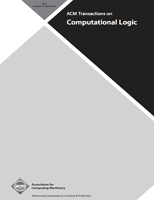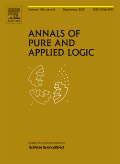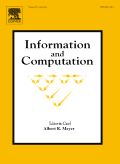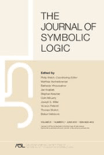
ACM Transactions on Computational Logic
Scope & Guideline
Advancing the Frontiers of Computational Logic
Introduction
Aims and Scopes
- Computational Logic:
The journal emphasizes the study of logical systems that can be effectively implemented in computational processes, including propositional and first-order logic, modal logics, and temporal logics. - Synthesis and Verification:
Research in this area focuses on methods for synthesizing systems and verifying their correctness, often employing formal methods to ensure that systems behave as intended. - Decision Procedures and Complexity:
The journal regularly publishes work on decision problems and complexity theory related to logical systems, contributing to understanding the computational limits of various logics. - Proof Theory:
A significant focus is placed on proof systems, including their completeness, soundness, and the development of new proof techniques, which are vital for both theoretical exploration and practical applications. - Applications of Logic in Computer Science:
This includes exploring how logical frameworks can be applied to areas such as artificial intelligence, programming languages, and systems design, thereby bridging theoretical research with practical implementations.
Trending and Emerging
- Quantum Logic and Computation:
There is an increasing focus on quantum logic and its applications in quantum computing, reflecting the burgeoning interest in quantum technologies and their implications for computational logic. - Temporal and Dynamic Logics:
Research on temporal logics, especially concerning their application in dynamic systems and verification processes, is gaining traction, highlighting their importance in modern computational contexts. - Logic in Artificial Intelligence:
The integration of logical frameworks within artificial intelligence, particularly in reasoning about knowledge and beliefs, is becoming a prominent theme, indicating the relevance of logic in advancing AI methodologies. - Complexity Theory and Advanced Decision Procedures:
The exploration of complex decision problems and the development of advanced decision procedures are trending, as researchers seek efficient solutions for increasingly complex logical systems. - Applications of Logic to Game Theory:
The application of logical frameworks to game theory, particularly in multi-agent systems and strategic reasoning, is emerging as a significant area of interest, reflecting the interdisciplinary nature of current research.
Declining or Waning
- Traditional Modal Logic:
Although modal logic remains a core area, there has been a noticeable decrease in papers focusing solely on traditional modal logic without integration into broader frameworks or applications. - Basic Proof Complexity:
Research specifically targeting foundational aspects of proof complexity appears less frequently, suggesting a shift towards more applied or complex scenarios rather than foundational studies. - Static Analysis of Logic Systems:
There seems to be a waning interest in static analyses that do not incorporate dynamic or temporal aspects, as the community moves towards more nuanced frameworks that address evolving systems.
Similar Journals

ANNALS OF PURE AND APPLIED LOGIC
Unraveling Complexities of Logic Since 1974ANNALS OF PURE AND APPLIED LOGIC is a premier academic journal published by Elsevier, specializing in the foundational aspects of logic since its inception in 1974. With a strong commitment to disseminating original research, the journal focuses on both pure and applied logic, making significant contributions to the fields of mathematics and computer science. The journal is recognized for its rigorous peer-review process and is currently ranked Q1 in Logic, reflecting its status among the top-tier publications in the discipline. Researchers will find valuable insights and advancements in logical theory and practice in its pages, while the journal's Scopus ranking further positions it strategically within the mathematical logic community. Although it is not an open-access publication, it offers convenient access options for institutions and subscribers, ensuring a wide reach for groundbreaking findings. The ANNALS OF PURE AND APPLIED LOGIC continues to be an essential resource for professionals, students, and academics alike, facilitating a deeper understanding of logical frameworks and their applications.

INFORMATION AND COMPUTATION
Exploring the Synergy of Information and ComputationINFORMATION AND COMPUTATION is a peer-reviewed academic journal published by Academic Press Inc., Elsevier Science, dedicated to advancing the fields of computational theory and mathematics, computer science applications, and information systems. With an ISSN of 0890-5401 and an E-ISSN of 1090-2651, the journal provides a platform for innovative research that spans theoretical and applied perspectives. Acknowledged for its impact in the community, it holds a Q2 quartile ranking in several categories, including Computational Theory and Mathematics and Computer Science Applications, as of 2023. These rankings place it among the leading journals in its field, making it an essential resource for researchers, professionals, and students aiming to stay abreast of cutting-edge developments. While it does not currently offer Open Access options, the journal intends to foster scholarly communication and knowledge sharing from its inception in 1987 to its future issues expected through 2024. Located in the United States, at 525 B ST, STE 1900, SAN DIEGO, CA 92101-4495, INFORMATION AND COMPUTATION is committed to publishing high-quality research that influences the theoretical foundations and practical applications of its diverse disciplines.

Logic and Logical Philosophy
Unraveling the Threads of ReasonLogic and Logical Philosophy is a distinguished journal published by Nicolaus Copernicus University Torun, Poland. With its ISSN 1425-3305 and E-ISSN 2300-9802, the journal has established itself as a premier outlet for cutting-edge research in the field of philosophy, specifically focusing on the intricate intersections of logic and philosophical inquiry. Since its inception, the journal has consistently demonstrated its impact within the academic community, achieving a commendable Q1 ranking in the 2023 Arts and Humanities category, placing it in the 73rd percentile of publications in the field. The journal aims to foster scholarly dialogue and contribute significantly to the advancement of philosophical understanding through rigorous research articles, critical reviews, and discussions. With a commitment to high academic standards and accessibility—though specific access options may vary—Logic and Logical Philosophy remains an essential resource for researchers, professionals, and students alike, paving the way for innovative philosophical discourse until 2024 and beyond.

JOURNAL OF AUTOMATED REASONING
Advancing the Frontiers of Automated ReasoningJOURNAL OF AUTOMATED REASONING is a premier academic journal published by SPRINGER, focusing on the dynamic and evolving fields of Artificial Intelligence, Computational Theory and Mathematics, and Software. With an ISSN of 0168-7433 and E-ISSN 1573-0670, this journal ranks impressively in the second quartile (Q2) across multiple categories, reflecting its significant contribution to the advancement of knowledge in automated reasoning methodologies. Since its inception in 1985, it has served as a vital platform for researchers and professionals to share groundbreaking findings and innovative techniques, facilitating the exploration of algorithms, logical frameworks, and reasoning processes that underpin artificial intelligence systems. Although it does not currently offer Open Access options, it remains a highly regarded resource, cited widely in academia, with its impactful publications reflecting deep insights and rigorous scholarly standards. The journal’s esteemed status and its ongoing commitment to fostering a greater understanding of automated reasoning make it an invaluable asset for those dedicated to pushing the boundaries of these interdisciplinary fields.

JOURNAL OF SYMBOLIC LOGIC
Fostering Scholarly Discourse in Logic and PhilosophyThe JOURNAL OF SYMBOLIC LOGIC, published by Cambridge University Press, stands as a leading platform for scholarly discourse in the realms of logic and philosophy. With a rich history dating back to 1938, this esteemed journal is dedicated to presenting cutting-edge research that pushes the boundaries of knowledge within symbolic logic and its applications. In 2023, it proudly holds a distinguished Q1 ranking in both Logic and Philosophy categories, reflecting its high impact and relevance in the academic community. Researchers and academics benefit from its rigorous peer-review process and contributions from leading scholars worldwide, ensuring the dissemination of high-quality research and critical theories. While the journal currently does not operate under an open access model, it remains a pivotal resource for professionals seeking to deepen their understanding of logical theories and philosophical inquiries. Explore the JOURNAL OF SYMBOLIC LOGIC to engage with scholarly articles that challenge conventional thought and inspire future research.

Reports on Mathematical Logic
Exploring the Foundations of ThoughtReports on Mathematical Logic is an esteemed academic journal published by Jagiellonian University’s Theoretical Computer Science Department in Poland. Focusing on the interdisciplinary realms of logic and philosophy, this journal publishes rigorous research articles that explore the foundational aspects and implications of mathematical logic in various contexts. Although it currently maintains an open access model, the journal's impact can be seen through its categorized rankings, with a Q4 in Logic and a commendable Q2 in Philosophy as of 2023. This positions it as a valuable resource for academics seeking to engage with innovative ideas and methodologies in the field. Additionally, the journal has a historical academic presence, having converged in its publication years from 2011 to 2014 and again from 2016 to 2023, underscoring its ongoing commitment to advancing knowledge in logic. With a focus on contemporary research, Reports on Mathematical Logic is essential for researchers, professionals, and students aiming to stay at the forefront of logic studies.

ACTA INFORMATICA
Fostering Innovation Through Rigorous Research.ACTA INFORMATICA is a prestigious academic journal published by Springer, dedicated to advancing the fields of computer networks and communications, information systems, and software engineering. With an ISSN of 0001-5903 and an E-ISSN of 1432-0525, the journal has continued to thrive since its inception in 1971 and is set to cover research up until 2024. Although it currently operates within a Q3 category in its respective fields, it is recognized for providing a platform for high-quality, peer-reviewed research, which is essential for fostering innovation and knowledge dissemination in computer science. While it does not offer an open access option, scholars benefit from its rigorous editorial standards and comprehensive coverage of significant trends and methodologies. The journal is conveniently based in New York, NY, USA, further enhancing its accessibility to a global audience. Researchers, professionals, and students alike will find ACTA INFORMATICA a valuable resource for staying abreast of the latest developments and breakthroughs in this vital area of study.

ARCHIVE FOR MATHEMATICAL LOGIC
Fostering Insightful Dialogues in Logic and PhilosophyArchive for Mathematical Logic, published by Springer Heidelberg, is a distinguished academic journal that delves into the intricate realms of mathematical logic and its philosophical implications. With an ISSN of 0933-5846 and an E-ISSN of 1432-0665, this journal is recognized for its rigorous peer-reviewed articles that contribute significantly to the understanding of logical frameworks. As of 2023, it has achieved a commendable Q2 ranking in Logic and a prestigious Q1 ranking in Philosophy, reflecting its impact within these intellectual fields. Operating from the United States with a publishing address in Heidelberg, Germany, the journal encompasses research spanning from 1988 to 2024, providing a rich historical context to contemporary discussions. With its robust Scopus rankings, it stands at the 70th percentile in Arts and Humanities - Philosophy and holds a notable ranking in Mathematics - Logic, further underscoring its relevance. While it is not an open-access journal, it remains vital for researchers, professionals, and students seeking to advance their knowledge and engage with cutting-edge discussions in mathematical logic and its philosophical applications.

Bulletin of the European Association for Theoretical Computer Science
Bridging Theory and Application in Computer ScienceBulletin of the European Association for Theoretical Computer Science is a distinguished journal dedicated to the field of theoretical computer science, published by the European Association for Theoretical Computer Science. With its focus on theoretical underpinnings, algorithmic framework, and the advancement of computational theories, this journal serves as a crucial platform for researchers, professionals, and students alike. While not an open access journal, it offers vital insights and findings that significantly contribute to the academic community in theoretical computer science. The journal is headquartered in Greece, at the Computer Technology Institute and Press-CTI in Rio, symbolizing a rich tradition of scholarly exchange within the European context. Researchers aiming to disseminate their work in this niche yet impactful area will find the Bulletin's blend of rigor and relevance invaluable as they seek to push the boundaries of knowledge in computational theory.

Journal of Logic Language and Information
Navigating the Complexities of Language through LogicThe Journal of Logic Language and Information, published by SPRINGER, stands as a leading interdisciplinary platform dedicated to the exploration of the interconnections between logic, language, and information theory. With a history spanning from 1992 to 2024, this esteemed journal provides a vital forum for researchers, professionals, and students in fields such as Computer Science, Linguistics, and Philosophy. Notably recognized in the 2023 rankings, it holds a Q2 quartile in Computer Science (miscellaneous) and Q1 quartiles in both Linguistics and Language, and Philosophy, reflecting its high academic quality and relevance. Despite its nuanced focus, the journal's diverse scope attracts a global readership, encouraging innovative research and critical discourse. Although it is not an Open Access publication, the Journal's valuable contributions can be accessed through various institutional subscriptions, ensuring that its scholarly output remains influential within the academic community.